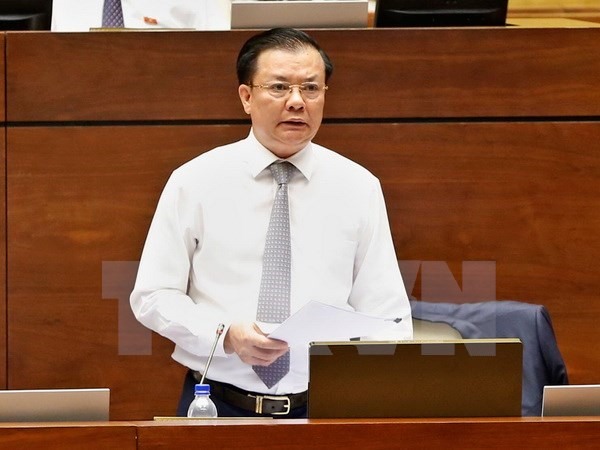 Politics & Law
Politics & Law

While the Government will make all efforts to meet the 6.7 per cent growth target set for the year, it will not compromise on the environment or macro-economic stability, Minister of Planning and Investment Nguyễn Chí Dũng said yesterday.
 |
| FInance minister Đinh Tiến Dũng delivers speech at the NA's meeting yesterday. — VNA/VNS Photo Doãn Tấn |
HÀ NỘI — While the Government will make all efforts to meet the 6.7 per cent growth target set for the year, it will not compromise on the environment or macro-economic stability, Minister of Planning and Investment Nguyễn Chí Dũng said yesterday.
He was responding to comments by National Assembly deputies who discussed a report dealing with implementation of the 2016 socio-economic development plan, the first four months of this year, as well as overall prospects for 2017.
The report was presented by Deputy Prime Minister Trương Hòa Bình at a NA meeting late last month.
The report said that the Consumer Price Index (CPI) in April this year increased by 0.9 per cent compared to December last year.
The interest rate was stable and likely to go down. Credit growth climbed 5.75 per cent – the highest year-on-year rise in six years.
Export turnover surged 16.8 per cent, mainly in processing and manufacturing industries, and agricultural products, the report said.
State Budget collection met 32.7 per cent of the set plan for the whole year, up 17.8 per cent. Newly-registered and additional foreign direct investment hit US$10.6 billion, up 40.5 per cent.
However, GDP growth in the first quarter was just 5.1 per cent, lower than the 5.48 per cent recorded during the same period last year.
Long term focus
Several deputies stressed the need to mobilise all efforts to meet the GDP target while ensuing growth quality, saying this was important to meet the long-term goal of sustainable socio-economic development.
“Under our current conditions, it is necessary to ensure both quantity and quality of growth,” said deputy Lê Thu Hà of Lào Cai Province.
Hà said she highly appreciated the Government’s determination to achieve an economic growth of 6.7 per cent this year, saying it would help create new jobs and meet increasing social welfare and security demands.
However, deputy Trần Thị Phương Hoa of Hà Nội said that there was the danger of Viet Nam falling into the middle-income trap if it could not maintain an average growth rate of seven per cent per year as planned for the 2016-2035 period.
Việt Nam should also achieve an average per capita income growth of 6 per cent per year, Hoa said.
He said: “In the 2016-2020 roadmap, if the country cannot achieve the targets set by the National Assembly, it will be difficult to fulfill its development plan for the next 30 years."
Deputy Nguyễn Tuấn Anh from the southern province of Bình Phước also praised the efforts made by the Government to manage the national economy.
He agreed with the eight socio-economic development solutions that the Government has proposed for the year in a report to the NA Economic Committee.
However, he asked that the solutions focus more on attracting the business community, particularly those willing to invest in high-tech agriculture.
Anh also felt there should be strict punishment for individuals, authorised agencies and organisations that caused difficulties or inconveniences for investors or enterprises in completing their investment procedures.
Deputy Nguyễn Thị Phúc of Bình Thuận expressed concern that two key targets, GDP growth and export turnover, were not met in 2016.
She asked the Government to provide an adequate, concrete analysis on the failure so that the situation could be understood thoroughly and appropriate lessons drawn for the future.
Given the forecast that the global economic developments can impact the domestic socio-economic development, the deputy was also concerned about the year’s growth target of 6.7 per cent.
Deputy Bùi Thị Quỳnh Thơ of Hà Tĩnh asked the Government to intensify the inspections and audits, and step up the fight against smuggling, trade fraud, tax loss and bad debt.
Spotlight on agriculture
Đoàn Văn Việt, a deputy from the Tây Nguyên (Central Highlands) province of Lâm Đồng, asked the Government to promulgate stronger and more specific policies to support the development of branded agricultural products and value chains for domestic and export markets.
“We need a clear policy framework that facilitates linkages between the State, scientists, entrepreneurs and farmers,” Việt said.
Responding to many questions from deputies on the national economic plan, including the rational for setting a 6.7 per cent growth target for 2017, Planning and Investment Minister Dũng noted that this year was the second year of implementing the Resolution of the 12th Party Congress as well as the Resolution of the NA on socio-economic development for the next five years.
It was very important to set the foundation this year for growth in the next few years, he said
There was also a need to speed up development in order to avoid lagging behind other economies, create resources for investment and development and maintain stability.
Furthermore, a balance had to be maintained in tackling issues of public debt, finance, budgeting, job creation, social security and environmental protection, Dũng said.
However, "the Government’s view is that the target should not be achieved at all costs. It will never trade off the environment or macro-sustainability," the Minister stressed.
At the NA’s third session, the deputies also discussed education reform, healthcare, infrastructure construction, environmental protection, administrative reforms and agriculture restructuring.
They focused particularly on promulgation of policies for poor and underprivileged people in remote, mountainous areas. –VNS




